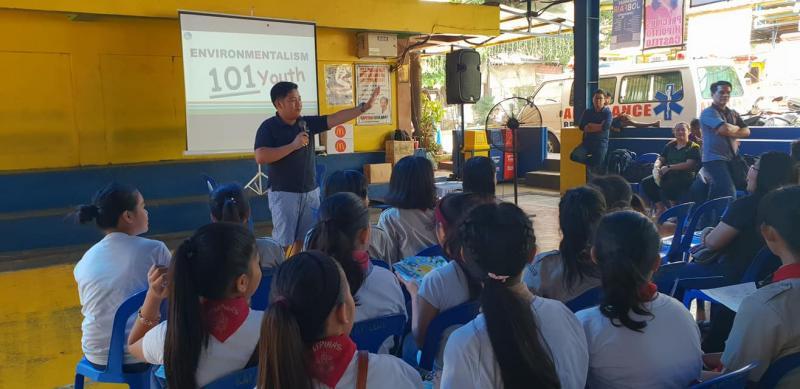Image

-
Vermon D. Timbas
Environmental Management Specialist II, Department of Environment and Natural Resources
- 30 Under 30
- 2019
Quezon City, Philippines SEE OTHER BIOS HERE
Age: 30
Vermon is an environmentalist aiming to "GREENducate" the Philippines, one youth at a time.
Tell us about yourself!
I am an Environmental Management Specialist II in the Department of Environment and Natural Resources (DENR) and also one of the youth advisers of GREENducation Philippines, the youth arm of the DENR Environmental Management Bureau that aims to empower Filipino youth through environmental education and green networking. Our goal is not only to educate youth about environmental stewardship, but also to impart skills and green values for them to influence and educate their fellow Filipino youth about environmental education.

Since I was in college, I have always wanted to be part of the solution to address environmental challenges. I started my green journey when I joined the Chemical Science Society in Bicol University, a college-based organization that takes an active role in promoting the importance of chemistry, both academically and socially. As a new organization, we started organizing tree-planting activities, coastal clean ups, and the Chemistry Magic Show, where we would do a magic show for the community and explain the science behind each experiment and its connections to the environment. During our environmental chemistry class with Professor Samuel Bobiles, he discussed the science behind environmental stewardship, how to reduce carbon footprints, and other solutions to address environmental pollution. That was a wake-up call to me to create the iPLEDGE Project, a campaign that encourages youth and students to live a greener lifestyle, reduce their carbon footprints, and make a pledge for the environment. The Chemical Science Society taught me and trained me = to become an effective leader and educator. They are my inspiration, and I owe my success to them.
What advice would you give to the next generation of leaders that are looking to bring about positive change in their communities through EE?
The essence of environmental education is translating awareness into action. We should be creative in communicating with our target stakeholders. It may take time to create effective communication tools and strategies, but it is very rewarding when you help develop green minds, green hands, and green hearts among your stakeholders – all of which result in improving people’s behaviors and attitudes toward the environment. I will always believe that there is no greater mission and no greater honor than providing this service for the Filipino people.
What keeps you motivated, inspired, or hopeful for the future?
Seven out of ten Filipino youth actively participate in environmental activities, and eight out of ten agree that their participation is important for our nation. These 2016 statistics from the National Youth Commission motivate me to develop programs and modules to further strengthen environmental education in the country (awareness), to be more inclusive and involve more youth in environmental activities (action), and to provide an avenue for young leaders and youth organizations to be more pro-active for environmental protection and conservation (collaboration).

The Philippines is one of the world's largest producers of coconuts. Just like the ordinary Filipino, this tree is simple yet can provide many basic needs for our people. Coconut trees can reach a height of 98 feet, while still attached to the ground by a strong fibrous root system. Similarly, in life, it's really important to strive to be a better leader and person, but stay grounded and stay humble even when we are at the peak of our success. Lastly, coconut trees generally have slender trunks which help guide coconut farmers to easily collect the coconuts. I compare this to being a youth leader - we need to guide and help aspiring young leaders to grow and become successful in their chosen field. Being a leader is not always about being the best, but rather about creating better lives for others.
SIGN UP FOR 30 UNDER 30 UPDATES